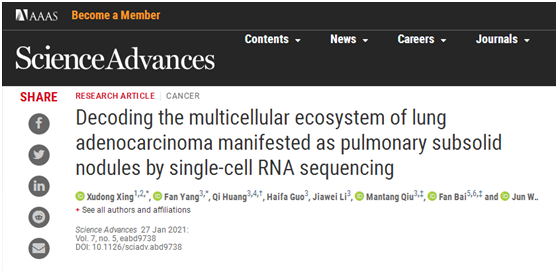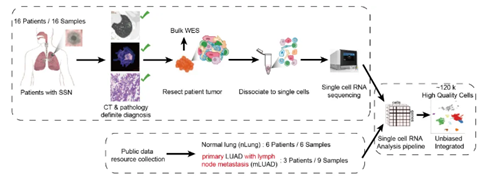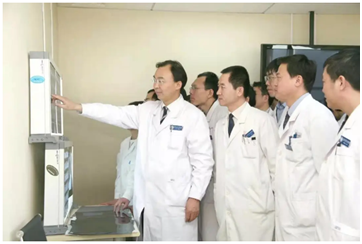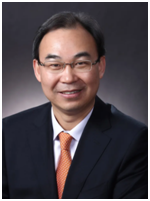Thoracic Surgery | Academician Wang Jun’s Team Publishes Study on Multicellular Ecosystem of Lung Adenocarcinoma Manifested as Pulmonary Subsolid Nodules in Science Advances
2021-04-20

Recently, the research group of the Academician Wang Jun from the Thoracic Surgery Department of Peking University People’s Hospital and the research group of Peking University Professor Bai Fan jointly published a research article titled “Decoding the multicellular ecosystem of lung adenocarcinoma manifested as pulmonary subsolid nodules by single-cell RNA sequencing” in the world-renowned journal Science Advances. This research provides new evidence for the clinical management of subsolid nodules (SSNs).
With the development of medical technology, the detection rate of pulmonary SSNs in Chinese population is increasing. SSNs have “ground glass” features in CT images and malignant SSNs are often pathologically manifested as pre-invasive lesionsearly-stage invasive lung adenocarcinoma.
At the same time, the management and treatment of SSNs has always been a controversial topic. However, the underlying biological basis for indolent growth pattern and good prognosis of lung adenocarcinoma (LUAD) manifested as SSNs has not been explained.
Therefore, understanding the occurrence and development of LUAD manifested as SSNs is of great significance for the early diagnosis and treatment of LUAD.
The research groups performed single-cell RNA sequencing analyses of 16 SSN samples, and integrated six adjacent normal lung tissues (nLung), and nine primary LUAD with lymph node metastasis (mLUAD) from published papers. High quality data were obtained from 118,293 single cells.

Research findings:
- Compared with advanced LUAD, the tumor cells in SSNs were less malignant and underwent metabolic reprograming and immune stress.
- The immune function of T / NK cells in SSN was in a state of immune monitoring and killing rather than exhaustion. A group of tumor-associated macrophages that are only enriched in advanced LUAD were found. This group of cells is significantly related to the prognosis of LUAD patients.
- The proportion of fibroblasts in SSNs did not differ significantly with that of normal lung tissue, but was completely different from that of advanced LUAD, lacking tumor-associated fibroblasts and pericytes.
Based on high-throughput single-cell transcriptome sequencing data, this study characterized the tumor microenvironment of SSNs, revealed the cell types, composition characteristics, transcriptome status and intercellular interaction of tumor cells, immune cells and stromal cells, and explained the biological basis for the better prognosis of LUAD manifested as SSN at the single-cell level.
The Department of Thoracic Surgery at Peking University People’s Hospital has been focusing on clinical and basic research of SSNs. Previously, 154 cases of LUAD manifested as SSNs were investigated by whole exome sequencing. It was found that the mutation burden of this type LUAD was low, and the mutational landscape and radiological features were systematically demonstrated (Eur Respir J. 2020;55(2):1901409).

This study is an extension of previous studies, and provides a better biological explanation for the prognosis of LUAD manifesting as SSN from the single-cell level, and serves as an important reference for clinical decision-making.
Paper link: https://advances.sciencemag.org/content/7/5/eabd9738
About the Author

Prof. Wang Jun, academician of the Division of Medicine and Health, Chinese Academy of Engineering (CAE), chair of the Department of Thoracic Surgery, Peking University People’s Hospital
In 1997, Prof. Wang Jun was awarded the Graham Fellowship, the most prestigious international award in the field of thoracic and cardiovascular surgery (only one winner in the world per year). He has studied and worked at the University of Chicago, Massachusetts General Hospital, and Mayo Clinic. He is now the chair of the Department of Thoracic Surgery at Peking University People’s Hospital. He is also the head of the endoscopic diagnosis and treatment technology expert group of thoracic surgery of the National Health Commission, chair of the Committee of Thoracic and Cardiac Surgery of Post-graduate Medical Education of the Chinese Medical Doctor Association, chair designate of the Committee of Lung Cancer of the Chinese Anti- Cancer Association, and the vice president of the Thoracic Surgery Branch and Endoscopic Branch of the Chinese Medical Doctor Association.
He won the second prize of the National Science and Technology Progress Award, the CAE Guanghua Engineering Science and Technology Award, and the Central Healthcare Excellent Individual Award. He has published more than 380 papers and written 14 books in Chinese and English.

